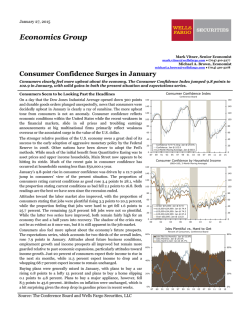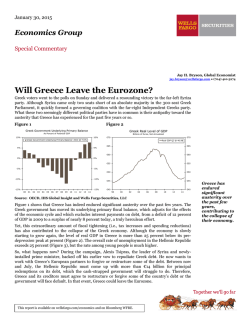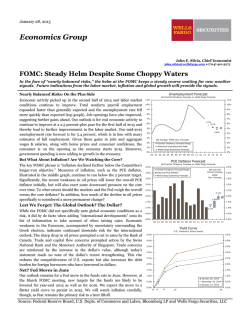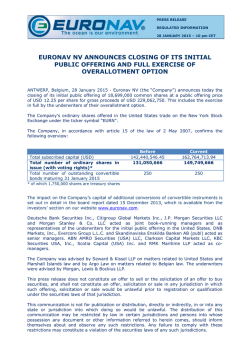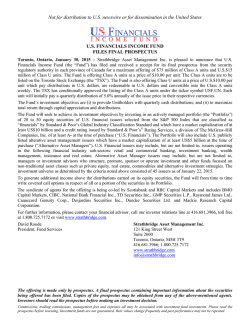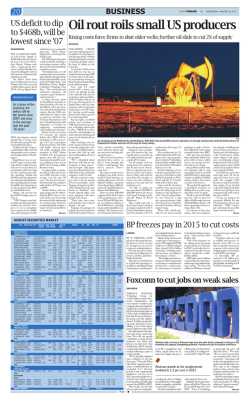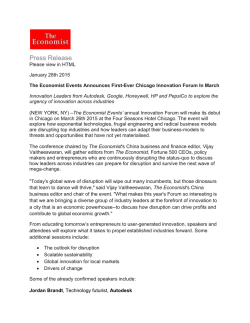
Millennials in the Economy V: Income Finally Picking Up
January 29, 2015 Economics Group Sarah Watt House, Economist [email protected] ● (704) 410-3282 Erik Nelson, Economic Analyst [email protected] ● (704) 410-3267 Alex V. Moehring, Economic Analyst [email protected] ● (704) 410-3247 Millennials in the Economy V: Income Finally Picking Up Millennials have experienced weaker earnings growth than older workers since the recession, but recent data point to a pickup. Over the past decade, the income gap between young and old households is little changed. Median Weekly Earnings of Full-Time Workers Wages Finally Accelerating for Millennials… Despite a noticeably stronger labor market in 2014, wage growth continues to flounder. Median weekly earnings for full-time workers have increased an average of 1.9 percent per year since 2008, nearly on par with inflation. With less work experience than their older counterparts and a larger shift into low-paying jobs, young workers have fared even worse (top chart). Median weekly earnings for 25-34 year olds have risen an average of only 1.6 percent per year and just 1.5 percent for 16-24 year olds working full time. More recently, however, wages for Millennials are staging a bit of a comeback. Median weekly earnings for 16-24 year olds have risen well ahead of older workers over the past year (middle chart). The increase comes as younger Millennials are working more hours and suggests slack is diminishing at the lower end of the skills spectrum. Wages for older Millennials (ages 25-34) have also accelerated and, while not growing as quickly over the past year as younger workers, have done a bit better at keeping pace with older workers since the recession. …But Lingering Income Effects From Graduating in a Recession Even as wages have picked up recently for younger Millennials, the effects of beginning their career in a weak labor market are likely to linger. Research finds that graduating in a recession can have long lasting negative effects on wages. Average starting salaries may be flat or even lower in some fields relative to the pre-recession environment, initial raises are likely to be more modest and more workers may be underemployed. Altogether, the implicit earnings loss can persist for around a decade.1 For the unlucky subgroup of Millennials to graduate during the Great Recession, the effects on earnings may be even more biting and persistent than past research suggests given the severity of the most recent downturn. Four-Quarter Moving Average, Q1 2008=100 118 118 16-24: Q4 @ 110.5 116 35-44: Q4 @ 112.7 114 45-54: Q4 @ 112.6 55+: Q4 @ 115.7 112 112 110 110 108 108 106 106 104 104 102 102 100 100 98 98 2008 2009 2010 2011 2012 2013 2014 Median Weekly Earnings Year-over-Year Percent Change of 4-Quarter Moving Averages 8% 8% 6% 6% 4% 4% 2% 2% 0% 0% 16-24: Q4 @ 4.8% 25-34: Q4 @ 2.4% 35-44: Q4 @ 0.8% 45-54: Q4 @ 1.7% 55+: Q4 @ 0.9% -2% -2% -4% -4% 02 03 04 05 06 07 08 09 10 11 12 13 14 15 Younger Households' Income Income Gap Fairly Steady Over Past Decade With historically slow wage growth, it is not surprising that, after adjusting for inflation, household income for Millennials has fallen since the Great Recession. Between 2007 and 2013, real income for households headed by someone under the age of 35 fell 14.6 percent. Most other households, however, have also seen real income decline over this period. Compared to all households, Millennials are only lagging slightly behind in the wake of the recession. In 2013, the median income for households younger than age 35 was 76.1 percent of the median for all households–down from 2007 but virtually unchanged since 2004 (bottom chart). The recent acceleration in weekly earnings is likely to have helped narrow that gap somewhat over the past year, but the income disparity between Millennials and older households remains noticeably wider than the prior generation. 116 25-34: Q4 @ 112.2 114 Median Income of Households Under 35 Relative to All Households 100% 100% 95% 95% 92.3% 90% 90% 85% 80% 83.3% 80.0% 85% 81.8% 82.1% 76.2% 78.3% 75% 80% 75.6% 76.1% 70% 65% 65% 60% 60% 55% 55% 50% 50% 1989 1992 1995 1998 2001 2004 2007 2010 2013 Source: U.S. Department of Labor, Federal Reserve Board and Wells Fargo Securities, LLC Altonji, Joseph G., Lisa B. Khan and Jamin D. Speer. (2014). “Cashier or Consultant? Entry Labor Market Conditions, Field of Study and Career Success.” NBER Working Paper No. 20531. 1 75% 70% Wells Fargo Securities, LLC Economics Group Diane Schumaker-Krieg Global Head of Research, Economics & Strategy (704) 410-1801 (212) 214-5070 [email protected] John E. Silvia, Ph.D. Chief Economist (704) 410-3275 [email protected] Mark Vitner Senior Economist (704) 410-3277 [email protected] Jay H. Bryson, Ph.D. Global Economist (704) 410-3274 [email protected] Sam Bullard Senior Economist (704) 410-3280 [email protected] Nick Bennenbroek Currency Strategist (212) 214-5636 [email protected] Eugenio J. Alemán, Ph.D. Senior Economist (704) 410-3273 [email protected] Anika R. Khan Senior Economist (704) 410-3271 [email protected] Azhar Iqbal Econometrician (704) 410-3270 [email protected] Tim Quinlan Economist (704) 410-3283 [email protected] Eric Viloria, CFA Currency Strategist (212) 214-5637 [email protected] Sarah Watt House Economist (704) 410-3282 [email protected] Michael A. Brown Economist (704) 410-3278 [email protected] Michael T. Wolf Economist (704) 410-3286 [email protected] Zachary Griffiths Economic Analyst (704) 410-3284 [email protected] Mackenzie Miller Economic Analyst (704) 410-3358 [email protected] Erik Nelson Economic Analyst (704) 410-3267 [email protected] Alex Moehring Economic Analyst (704) 410-3247 [email protected] Donna LaFleur Executive Assistant (704) 410-3279 [email protected] Cyndi Burris Senior Admin. Assistant (704) 410-3272 [email protected] Wells Fargo Securities Economics Group publications are produced by Wells Fargo Securities, LLC, a U.S broker-dealer registered with the U.S. Securities and Exchange Commission, the Financial Industry Regulatory Authority, and the Securities Investor Protection Corp. Wells Fargo Securities, LLC, distributes these publications directly and through subsidiaries including, but not limited to, Wells Fargo & Company, Wells Fargo Bank N.A., Wells Fargo Advisors, LLC, Wells Fargo Securities International Limited, Wells Fargo Securities Asia Limited and Wells Fargo Securities (Japan) Co. Limited. Wells Fargo Securities, LLC. ("WFS") is registered with the Commodities Futures Trading Commission as a futures commission merchant and is a member in good standing of the National Futures Association. Wells Fargo Bank, N.A. ("WFBNA") is registered with the Commodities Futures Trading Commission as a swap dealer and is a member in good standing of the National Futures Association. WFS and WFBNA are generally engaged in the trading of futures and derivative products, any of which may be discussed within this publication. Wells Fargo Securities, LLC does not compensate its research analysts based on specific investment banking transactions. Wells Fargo Securities, LLC’s research analysts receive compensation that is based upon and impacted by the overall profitability and revenue of the firm which includes, but is not limited to investment banking revenue. The information and opinions herein are for general information use only. Wells Fargo Securities, LLC does not guarantee their accuracy or completeness, nor does Wells Fargo Securities, LLC assume any liability for any loss that may result from the reliance by any person upon any such information or opinions. Such information and opinions are subject to change without notice, are for general information only and are not intended as an offer or solicitation with respect to the purchase or sales of any security or as personalized investment advice. Wells Fargo Securities, LLC is a separate legal entity and distinct from affiliated banks and is a wholly owned subsidiary of Wells Fargo & Company © 2015 Wells Fargo Securities, LLC. Important Information for Non-U.S. Recipients For recipients in the EEA, this report is distributed by Wells Fargo Securities International Limited ("WFSIL"). WFSIL is a U.K. incorporated investment firm authorized and regulated by the Financial Conduct Authority. The content of this report has been approved by WFSIL a regulated person under the Act. For purposes of the U.K. Financial Conduct Authority’s rules, this report constitutes impartial investment research. WFSIL does not deal with retail clients as defined in the Markets in Financial Instruments Directive 2007. The FCA rules made under the Financial Services and Markets Act 2000 for the protection of retail clients will therefore not apply, nor will the Financial Services Compensation Scheme be available. This report is not intended for, and should not be relied upon by, retail clients. This document and any other materials accompanying this document (collectively, the "Materials") are provided for general informational purposes only. SECURITIES: NOT FDIC-INSURED/NOT BANK-GUARANTEED/MAY LOSE VALUE
© Copyright 2026
